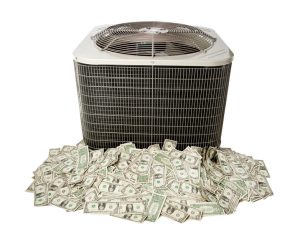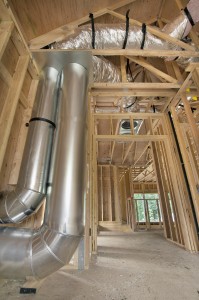Ducts are one of the most unobtrusive, and vital, parts of your heating system. They serve the same function in your home that your lungs do in your body. Even though your home won’t die if the ducts aren’t working correctly, the quality of life inside will definitely suffer. Most homeowners ignore their ducts, not because of any intentional neglect but because they simply don’t think about them. It’s time to get rid of that kind of attitude and really be aware of the role that your ducts play in your home. Let’s take a look at why duct repair is so important for your heating system.
Duct Construction
The sad fact of the matter is this: ducts are often not very well constructed. The primary needs for a piece of duct to do its job properly are: be light enough to be easily secured in walls and ceilings, be cheap enough to be easily replaced if necessary, and be small enough as to be unobtrusive to the occupants of the home. When these three factors are added up, you get a part of your heating system that is not very sturdy or long lasting. At this point you may be thinking that your ducts work just fine, and they haven’t been touched in years. Well, it may surprise you to know just how in need of repair your ductwork is.
Ductwork Repair Issues
As previously mentioned, ducts are relatively flimsy and vulnerable to damage. Now, because of their location there isn’t much that can actually deal a lot of damage at once to your ducts. Unfortunately, there doesn’t have to be. As the ducts have warm air flowing through them, they expand and contract due to the temperature changes. This causes small leaks to form in the ducts, allowing heat to leak out of the ducts before reaching their destination. An average forced air system can actually lose up to 30% of its total heat output this way, according to the US Department of Energy. This is why duct repair is so important for the efficiency of your heating system.
If you haven’t had your ducts checked in a while, contact Clean Air Act. We provide duct repair throughout Beaverton.
Continue Reading
Tags: Beaverton, Duct Repair
Posted in Duct Repair | Comments Off on Why Is Duct Repair Important for Heating?
 A good HVAC contractor in Troutdale, OR will be more than happy to answer every single one of your questions. On top of the usual questions like “how much will this cost?” and “Do I really need this or that?” we have a few more questions you can add to your list.
A good HVAC contractor in Troutdale, OR will be more than happy to answer every single one of your questions. On top of the usual questions like “how much will this cost?” and “Do I really need this or that?” we have a few more questions you can add to your list.
 Having a much-needed heating or cooling system installed is a wonderful feeling, but that’s only half the battle… If you want to reduce your energy costs every month, you’ll need to maintain the balance between comfort and efficiency. Luckily, we have a few tips to help you with that.
Having a much-needed heating or cooling system installed is a wonderful feeling, but that’s only half the battle… If you want to reduce your energy costs every month, you’ll need to maintain the balance between comfort and efficiency. Luckily, we have a few tips to help you with that. Central air conditioners rely on a series of ducts to take cooled air through your home
Central air conditioners rely on a series of ducts to take cooled air through your home